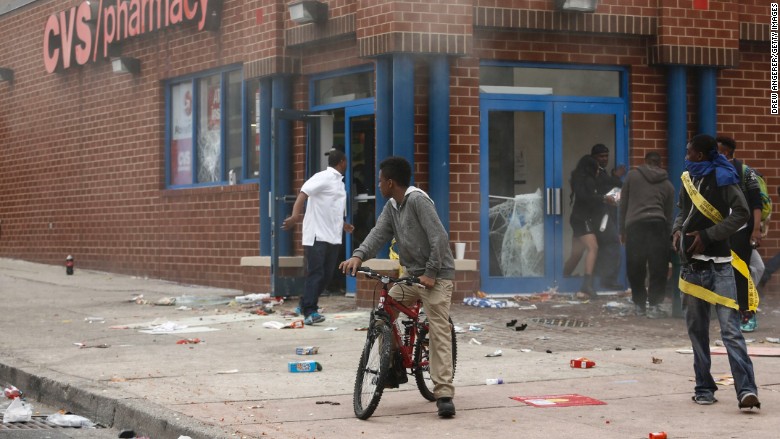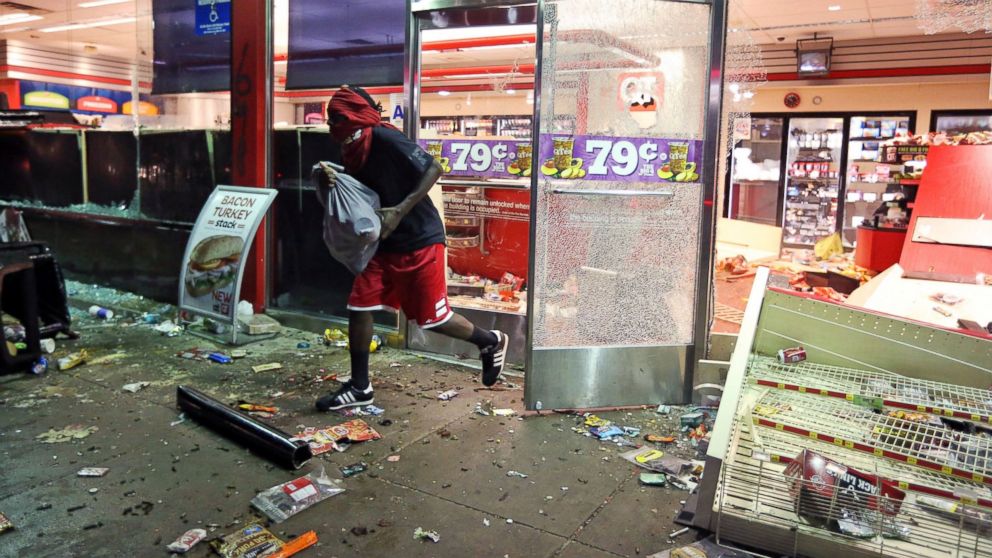
Baltimore, 2015. $40,000 worth of stolen drugs are now on the streets.

Ferguson, MO 2014. Looting right in front of police and reporters.

London, UK riots 2011. What is different? What is similar?
Posted on 06/14/2016 7:01:33 AM PDT by RightGeek
For several years, so-called "food deserts"—low-income neighborhoods devoid of nutritious food options—were an oft-cited culprit for America's high obesity levels. Everyone from state senators to Michelle Obama had ideas about how to fix the issue, from launching new farmer's markets in these neighborhoods to state grant programs designed to entice more fruit-and-veggie offerings to bans on new fast-food restaurants opening in these areas. The kicker was a multi-million dollar federal initiative, spearheaded by the First Lady, to promote farmer's markets and attract more grocery-store chains to food-desert neighborhoods.
"Since 2011, the Federal Government has spent almost $500 million to improve food store access in neighborhoods lacking large, well-stocked grocery stores," according to the U.S. Department of Agriculture (USDA). [SNIP]
The theory was simple: poor people simply lacked easy access to healthy food options. If you put fruits, vegetables, and whole grains in front of them, they would soon be singing the praises of Michael Pollan, too. And voila: no more obesity epidemic in these neighborhoods.
But of course things didn't work out that way. As many business owners in these neighborhoods and other food-desert skeptics have pointed out, the problem wasn't that they simply hadn't thought to offer more wholesome items. The problem was that these items just didn't sell. You can lead human beings to Whole Foods, but you can't make them buy organic kale there.
The USDA just admitted as much, with a new report on food deserts. Highlights note that proximity to supermarkets "has a limited impact on food choices" and "household and neighborhood resources, education, and taste preferences may be more important determinants of food choice than store proximity."
(Excerpt) Read more at reason.com ...
And the wagon is painted John Deere green and yellow.
And no diaper on the horse
When I lived in West Philly, I often bought my fruit and veg from a truck. It was cheaper and better that the chain grocery a block away. I think low cost options like the Arabbing in Baltimore or several food trucks going to these neighborhoods would have worked better and been more cost effective than whatever the govt did.
One of the problems with ‘food deserts’ - we had a chain grocery store, but it wasn’t very good. We also had people with various income levels, many of whom could have paid for a better selection. The problem in a lot of cities (at least on the east coast) is that people don’t have cars. This makes it difficult to do major shopping elsewhere if you can’t find what you want nearby.
Online shopping is helpful (I did it all the time in Seattle, being carless there as well), but I don’t know how many of these services will go to hardcore inner cities.
Thhe USDA admits its irrelevance.
“...we were amazed at how many of the locals would walk through the supermarkets grazing on the fruit, cookies and chips. You could find open bags of snacks on nearly every shelf.”
Yep. Marts won’t prosecute for that. They’d have to have dozens of employees just watching customers continuously to have grounds. So, you take the kids, have a meal with drinks, drop the wrappers and empties, buy $5 of snacks on SNAP and head home.
The amount of loss from theft, in-store eating and waste (cold food left on staple shelves) would astound most people.
Also -- never heard the term "driveway", but I did hear "alley street" -- those were one-car width between the backs of rowhouses, often concrete and with a slight v-shape so that water could run down in the center groove. Pronounced more correctly, "allie shtreet".
But maybe because of the origins of the town as a major port city and the 400-year-old ethnic enclaves, you could hear different dialects and terminology every seven or eight blocks. I loved Philly in the old days, before the yuppies took over.
There are only three relatively natural food substances that are addictive: salt, sugar and fat. True. You have to treat yourself like a patient every once in awhile to break the habits.
In the early days of the great migration of people from rural areas to the northern cities for industrial work, many of the grandparents still knew how to farm and they grew vegetables in their small yards. Pole beans, tomatoes, cucumbers, radishes, rhubarb, mustard or collard greens, cabbages, squash, sunflowers -- easy to grow even in somewhat limited light if the street was wide enough and not overgrown with trees.
They are, though, NOT liquor store deserts, hair weave deserts, nail salon deserts...

Baltimore, 2015. $40,000 worth of stolen drugs are now on the streets.

Ferguson, MO 2014. Looting right in front of police and reporters.

London, UK riots 2011. What is different? What is similar?
I wore out several of these when I lived in Philly:

The only time those got a break was when I was pushing a stroller, which also had a wire basket on the back, and you could hang plastic bags on the handles. Then there was the double baskets on the back of my bike...

...and also the child seat, where you could strap a grocery bag or a watermelon in place as long as the child wasn't along for the ride.

A drawback, for sure.
FTA: spent almost $500 million to improve food store access in neighborhoods lacking large, well-stocked grocery stores.
Just how did they do so? What did they do other then line someone’s pockets with lots of money? Did they even open a vegetable stand somewhere?!
This would be an extrapolation of "poor people have poor ways".
Another thing I got was that maybe ghetto folks make better decisions when surrounded by higher-socioeconomic folks. The reason I say that is because I have seen an odd dynamic in my city: when a nice supermarket opens up in the wealthier part of town, black folks will drive out of their way to go there even though an equivalent is closer, as if they just want the ambiance or prefer to not get stabbed in the parking lot.
Thoughts?
Some succulents are edible!
I read your “succulents” as “succubus”.
Thanks for the well thought out post.
As a conservative I believe in free will and the individuals’ liberty/responsibility to make correct choices in life.
Thus, when you reference something “forcing” ghetto people into the right choices, it kinda turns my stomach a bit.
Their ability to make the right choices, as a life path, should be determined by their parents when they raise their kids right.
Oh wait, I think we’ve just hit upon the crux of the problem!
First two steps....(1)law and order in those neighborhoods and (2) jobs, not handouts
Disclaimer: Opinions posted on Free Republic are those of the individual posters and do not necessarily represent the opinion of Free Republic or its management. All materials posted herein are protected by copyright law and the exemption for fair use of copyrighted works.